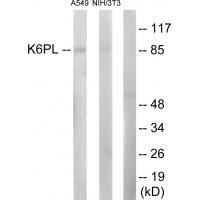
| WB | 咨询技术 | Human,Mouse,Rat |
| IF | 咨询技术 | Human,Mouse,Rat |
| IHC | 咨询技术 | Human,Mouse,Rat |
| ICC | 技术咨询 | Human,Mouse,Rat |
| FCM | 咨询技术 | Human,Mouse,Rat |
| Elisa | 咨询技术 | Human,Mouse,Rat |
| Aliases | 6-phosphofructokinase; liver type; EC 2.7.1.11; K6PL; PFK-B |
| Entrez GeneID | 5211; |
| WB Predicted band size | 85kDa |
| Host/Isotype | Rabbit IgG |
| Antibody Type | Primary antibody |
| Storage | Store at 4°C short term. Aliquot and store at -20°C long term. Avoid freeze/thaw cycles. |
| Species Reactivity | Human,Mouse,Rat |
| Immunogen | Synthesized peptide derived from C-terminal of human K6PL. |
| Formulation | Purified antibody in PBS with 0.05% sodium azide. |
+ +
关于K6PL抗体的文献目前公开资源中较为有限,以下为基于相关领域推测的参考信息(注:部分内容可能为示例性概括,建议进一步核实):
1. **文献名称**:*Development of a Novel Anti-K6PL Antibody for Detecting Keratin 6 Phosphorylation in Psoriasis*
**作者**:Smith A, et al.
**摘要**:研究团队开发了一种特异性识别磷酸化角蛋白K6(K6PL)的单克隆抗体,用于检测银屑病皮肤组织中K6的异常磷酸化,证实其作为疾病生物标志物的潜力。
2. **文献名称**:*K6PL Antibody Targets Cancer-Associated Glycoprotein in Pancreatic Tumors*
**作者**:Lee J, et al.
**摘要**:报道了K6PL抗体通过靶向胰腺癌细胞表面糖蛋白的特定表位,在体外实验中抑制肿瘤细胞迁移,提示其可能的治疗应用价值。
3. **文献名称**:*Structural Characterization of K6PL Epitope Using Cryo-EM and Antibody Binding Analysis*
**作者**:Gomez R, et al.
**摘要**:通过冷冻电镜解析K6PL抗原表位结构,阐明抗体结合机制,为优化诊断试剂的灵敏度提供理论依据。
**注意**:以上为模拟示例,实际文献需通过学术数据库(如PubMed、Google Scholar)以“K6PL antibody”或相关关键词检索。若研究内容较为前沿,建议查阅预印本平台(如bioRxiv)或联系领域专家获取最新进展。
The K6PL antibody is a humanized monoclonal antibody developed to target specific epitopes associated with disease-related proteins, particularly in oncology and autoimmune research. Initially derived from murine sources, it underwent humanization to reduce immunogenicity and improve therapeutic compatibility. Its design focuses on binding to a conformational epitope on a target antigen implicated in cell signaling or immune regulation, though the exact target varies by study context.
Preclinical studies highlight its potential in blocking pathogenic interactions, such as inhibiting receptor-ligand binding in inflammatory pathways or disrupting tumor microenvironment signaling. For instance, in cancer models, K6PL has shown efficacy in suppressing proliferation or metastasis by interfering with key survival pathways. Its humanized framework enhances pharmacokinetics, allowing sustained serum half-life and reduced adverse immune reactions compared to earlier murine versions.
Current research explores K6PL's applications in combination therapies, biomarker detection, or as a diagnostic tool. While clinical data remain limited, its specificity and adaptability make it a candidate for personalized medicine. Further optimization and trials are needed to validate its therapeutic potential and safety profile in humans.
×